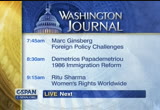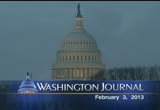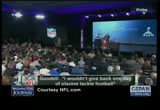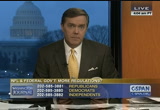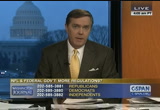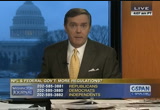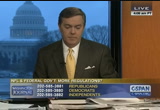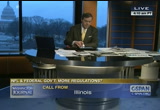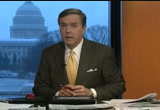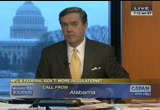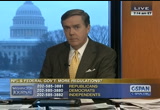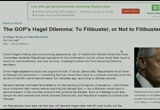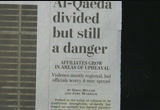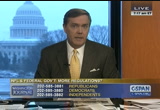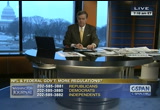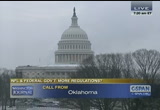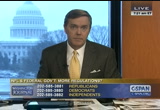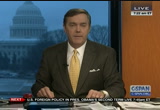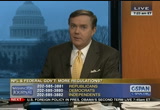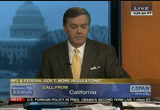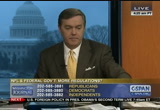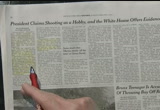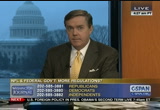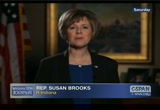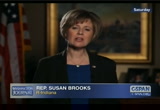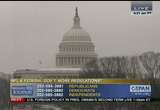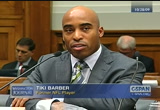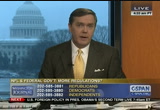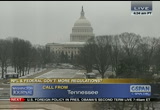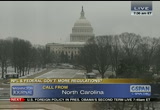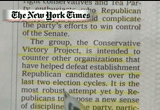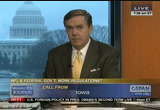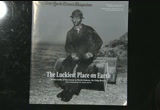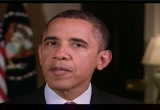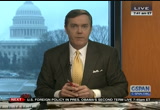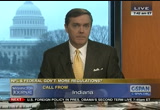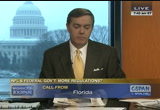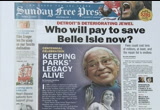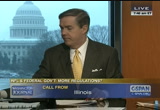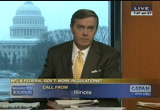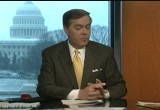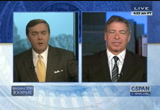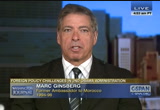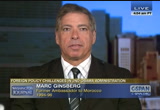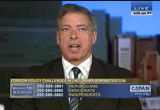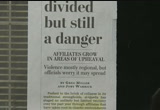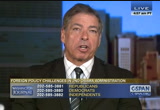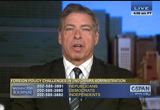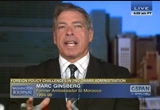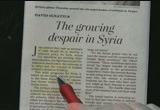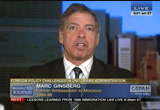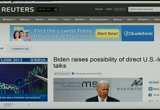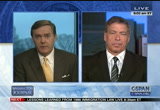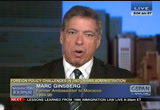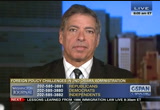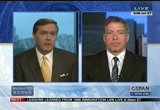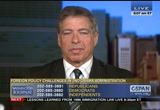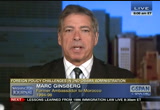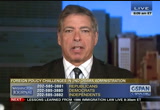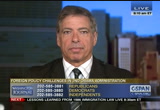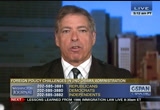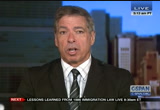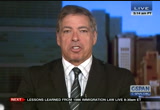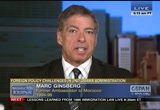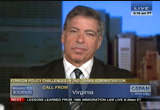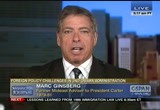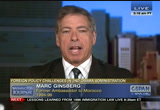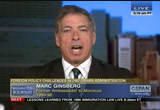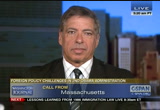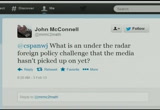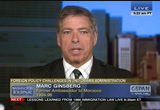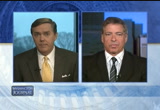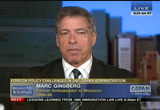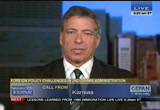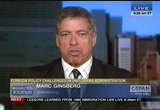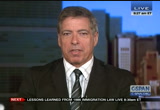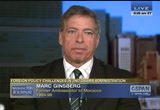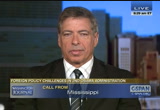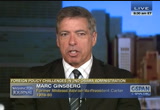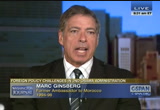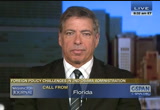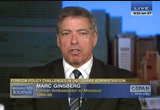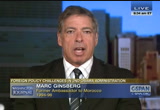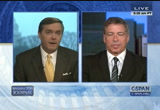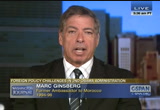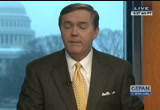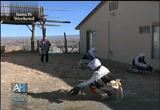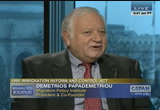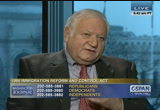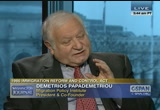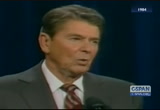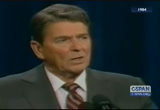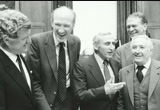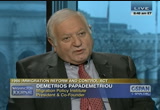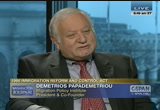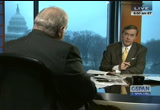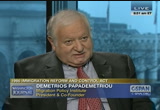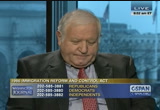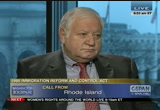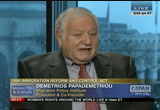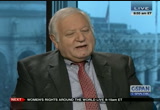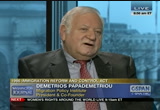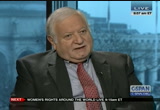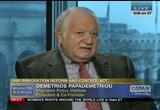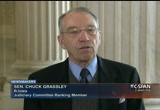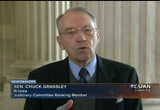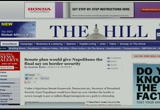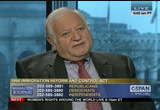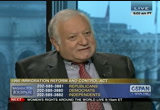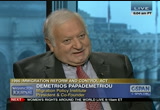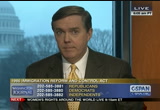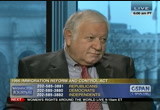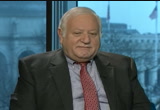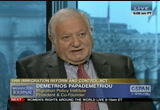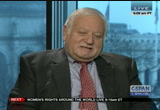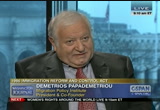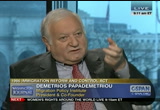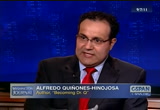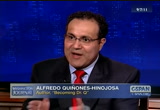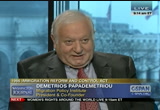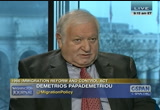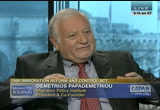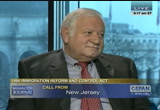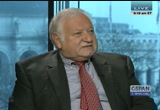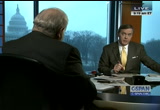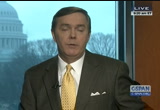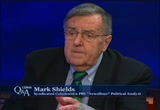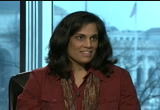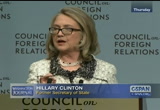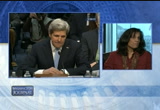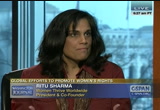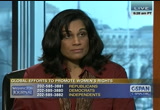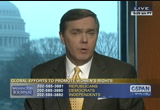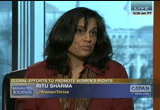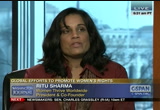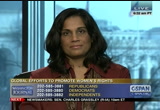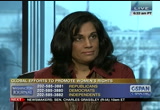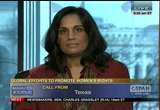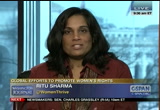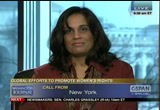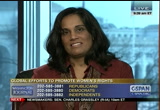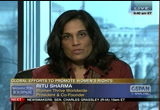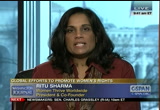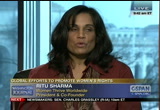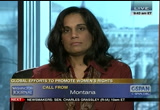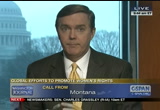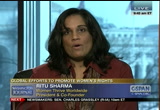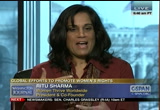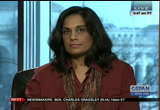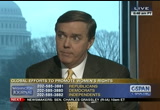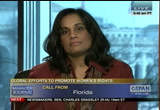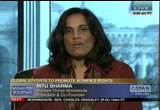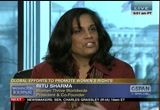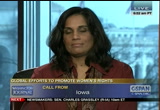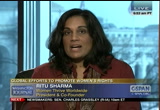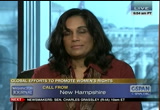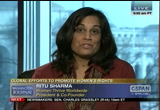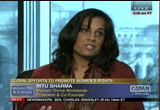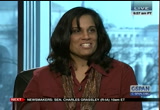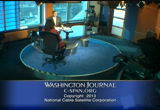tv Washington Journal CSPAN February 3, 2013 7:00am-10:00am EST
7:00 am
later, the president of women tribe worldwide tax about the state of women's rights. " washington journal host: good morning. we will learn more about immigration with the judiciary committee. the senate could work this week on the chuck hagel nomination. the question remains whether or not republicans will block the nomination with a filibuster. the president traveling to push for slacker gun laws. with the nation focusing on the super bowl, we want to turn to washington's role on regulating the nfl.
7:01 am
7:02 am
7:03 am
collective bargaining agreement that the players should be tested for hgh, but the two sides of that agreed. two seasons have been played without it. last weekend in new orleans, roger goodell was asked a number of questions including one on the issue of head injuries. here is more from last week. [video clip] >> i welcome the president's comments. we want to make sure people understand what we are doing to make our game safer, not just in the nfl but throughout sports. the changes we are making a in the nfl are changing all of sports. it is a better recognition of head injuries. of treating them conservatively. that affects every sport beyond sports. for the troops overseas.
7:04 am
what we are doing is leading the way to make sure people understand that you need to treat these injuries seriously. host: the head of the nfl responded to a statement made by the president in an interview with the republic. we are talking about the issue of the nfl and the federal government, whether there needs to be more regulations. caller: good morning. i just want to comment that with injuries and any sport and any injury, i think -- i was a medic in the coast guard. the cold constricts the blood flow. it helps control the blood flow. ice -- cold and pressure. i think ice needs to be there with the trainers and immediately when somebody is
7:05 am
down. if ice is applied with nominal pressure to an injury, i think it would really help. i would like to make a comment about drug use. a and 67 years old, i do nordic ski racing in the winter and bicycle racing in the summer -- mountain and road banks -- bikes. i and disappointed and lance armstrong. unfortunately, drugs are really prevalent a in all sports. i suspect some of my colorado competitors close to the south -- host: on that issue when it comes to human growth hormone, should there be more government regulation? is there -- caller: the u.s. anti-dumping
7:06 am
agency is working the best that they can. there just needs to be more drug testing. host: thank you for the call. steve is joining us from minnesota. caller: good morning. you know -- am i on? host: you sure are. caller: the building behind you. when these people get into it, they really screwed up. i do not know. host: ok. we will leave it there. our question, should there be more regulations on this super bowl sunday? a story from politico. if you are watching the game tonight, you will see a 32nd spot. the headline -- " super --2013: bloomberg-founded mayors' group
7:07 am
sponsors gun control ad." the ad calls for lawmakers to pass rules requiring background checks. it is narrated by children with "america, the beautiful"playing in the background. where are you calling from? you are on the air. caller: i would like to comment that if the president and government is so worried about injuries a dental health, maybe they should consider the abortion issue and the disproportionate killing of african american babies. host: ok. from "the new republic." he was asked about football injuries at the high school level and the nfl and he said "i am a big football fan, but if i
7:08 am
7:09 am
forth against the skull, that is what is causing the problem. ok? for them to do that, they have to play football. host: why should the government step in if they are stupid enough to take hgh? let's go to the news conference when the nfl was asked about head injuries but also the use of steroids by players. [video clip] >> you are correct. in the collective bargaining agreement we did agree tho hgh testing. we agree to neutral arbitration. we will do that as soon as we reach an agreement on the hgh which i expect and hope will be very soon. we have moved down that path and
7:10 am
any effective way. host: from last thursday, the head of the nfl to questions on a wide range of topics including head injuries and the use of steroids. the question we are asking, should there be more oversight, more regulations. caller: you have a collective bargaining agreement that would typically control the field on this. absent some type of controlled substance issue -- whether they will agree to testing, the h g h issue is likely regulated as a controlled substance. under those issues, it is whether you will test for it. specifically with regard to concussions.
7:11 am
then you have whether congress should step and, regulate, running on a separate track. i think the pochette issue is probably the clearest path. --osha issue is the safest path. have a regulatory scheme in place to deal with it. i think this is something osha could at least inquire about. there is a clear path. if congress wants to look back, there is a clear path to do that and start that kind of an inquiry under existing regulations. >> thank you for the call. from the twitter from-- you can join us online on twitter.com. many already weighing in on the facebook page.
7:12 am
caller: good morning. i would just like to say that as a player in the nfl, i do not see it any different as a person who joins the military. maybe one day you might be sent off to fight in a war. you could be shot and killed. playing in the nfl, you could possibly be injured gravely. i do not see any difference in either one of them. host: let me go back to the "washington post" story/
7:13 am
. they have been unable to launch a population study that the union says is necessary to determine what constitutes a positive test for athletes. they have been unsuccessful in their previous attempts to push negotiations forward. congress' increasing the pressure on the issue of human growth hormones and their use in the nfl. our question this morning, what should the role of the federal government be. frank is joining us. caller: i wanted to call and answer your question with a simple no. there should be no government intervention. i do believe the government should perhaps enter into concerns over the ncaa rules and
7:14 am
regulations committee in north america because i think the author and patriarch of many of the problems that we have as it is related to reference identification and location, the reality of problems as they are with the team owners, to managers, a team investors. i have been concerned over reports there is a complete non bias in the ncaa as it relates to our national athlete, whether a high school player, a college player, are a professional player. i think we investigate the circumstances we will see the elements of investment, portions of what are simply unattainable of maturity to the ncaa, but all for a reference of a great liability to our players and surrounding personnel.
7:15 am
7:16 am
one senator announcing he will support chuck hagel, is a fellow senator from nebraska. caller: good morning. i just wanted to say, it is an undue burden on of minorities that cannot get i.t. to vote to have to get a background check for a gun. the government just misses up everything they do. how can they get a gun if they are going to do a background check if they do not have an id? host: thank you. another story from "the washington post." the reporting of greg miller and joby warrick.
7:17 am
7:18 am
i think people understand professional sports -- it is the government's role to help assist and a grow the culture and help our culture transformed as time goes on and as people transform. i think there is some things we provide professional sports benefits with. fundamentally, over all, i think as a government, we are wasting our time creating councils and creating panels where politicians sit on them and make decisions about athletics when in actuality they need to be making decisions about foreign policy and how we get people
7:19 am
back to work in this country. i think we need to focus on that instead of trying to prosecute barry bonds for lying about taking steroids. that is not the biggest issue in the world. the biggest issue is starving kids on the street. thank you for your time. i would like to give a shout out to bobba bouy. host: on the trail of a senatorial scandal. two stores related to senator menendez. prostitutes fill its streets. next to that with a picture who denies any wrongdoing, women named by the tipsters exist, but not anymore. it points out the shadowy
7:20 am
tipster that made the allegation involving bob menendez and underage prostitutes and the dominican republican gave names. despite the details, the women are nowhere to be found. inside "the washington post," giving him the worst week in washington. from oklahoma, good morning. caller: i do not mean to be rude about this. but with all of the regulations going on, it is kind of silly. how far do you go with it. it is getting silly. how far do you go with this stuff? host: thank you for the call. it relates to comment on all of this. jim is from rhode island.
7:21 am
good morning. caller: i do think we need some regulation. but to our own devices, they could put the lions out there in the coliseum and it would be a good pay-per-view audience for that. another is a little extreme, but i think you need some regulations so when the kids are playing football and so forth. host: where do you draw the line? do you start at the high school level? is that the responsibility of local school districts or county or the state? caller: well, i just think they have to start somewhere. there are way too many head injuries. i think it is worth looking into. host: to try for the call. rick is joining us from pennsylvania. -- thank you for the call. caller: hockey has not done this study. soccer has not done it or you are hit constantly with a ball going 80 miles per hour. i have been around athletics for
7:22 am
most of my adult life. i have seen young men play high school, college football bowl onto live productive healthy lives. i think of anyone took a percentage of people playing football, the percentage of injuries would be -- one is too many. it would be a very small percentage. the nfl is different. airplane 20 games a year, really playing two seasons where most colleges play 10 or 11 games. i have read an article, perdue has developed a helmet that will be twice as safe as the one being used now. i think the game at the high school and college level is safer than it has ever been. host: 21 for the call. next is steve from kansas on the line for republicans. the nfl and the federal government, should there be more regulations? caller: i am not sure there should be more regulations.
7:23 am
the game itself is a violent sport. i played it. the companies that manufacture helmets, pads, and this and that to make the game a safer sport, you know, they are making their money. what the point is, all of the companies that are making the bunny -- i played at colorado state. i knew all of the money was coming in every time we went to a ballgame and all of the tv companies are coming and the. they did not give a shit -- host: i will stop you there. thank you for sharing the experience up until these swearword. we apologize for that. is your saying "it is not the government's role."
7:24 am
we normally do not talk about sports on this program, but we are asking about the public policy side of all of this. the president weighing in on an interview with "the new republican"saying he would have to give serious thought if he had a son whether or not he would want his son to play football. the role hgh is playing with players, should there be more government regulations? next is a mark from long beach, california. caller: good morning. i was thinking the problem football is having as they are not politically correct. the politically correct crowd is after them. they should get some women playing football. obama thinks because his son should not play football because it is dangerous. sending females into front-line combat units -- that is not too
7:25 am
dangerous. in the twisted liberal mind, we have to get women -- we have to get a couple of players to admit they are homosexuals. then it will become a cause -- host: thank you for the call. a front page under the fold, a picture getting a lot of attention. this photograph, an executive order pulled to document the president's skeet shooting. we will talk more about this and a couple of minutes. naperville, ill., good morning on the republican line. caller: yes. i think the officials should take some responsibility as far as blowing the whistle sooner.
7:26 am
umpires should take more responsibility. host: to life for the call. from "the new york daily news," "bam." a picture snapped last august, it shows his mastery of shotgun while skeet shooting. the white house released the photograph saturday, possibly to muzzle critics suggested obama was posturing when he talked about shooting in an interview with "the new republic magazine." this is how the story plays out inside the new york times. he claims shooting is a hobby and the white house offers evidence.
7:27 am
back to your calls on the issue of the nfl. should there be regulations when it comes to the players and the players union? claudia is on the independent line. caller: i was wondering what the rate of injury is in rugby. i used to be a real football fan. i watch rugby when i get a chance. it is a really rough game, but they do not wear helmets or too much padding. host: to live for the call. brian is next. -- thank you for the call. caller: hey, man, what are you into? host: we will go next to mississippi. caller: i think the government has its head into many things right now. the tax dollars are going to go up more. we need less programs, and more
7:28 am
states rights. host: thank you for the call. susan brooks, a republican of indiana, giving the gop response as congress comes back to work this week. the ongoing debate over the rising debt and deficit and how to rein in government spending. here is a portion of the address. [video clip] >> i recently voted to present the democratic majority in the u.s. senate with a simple but powerful challenge. pass a budget, or you do not get paid. by forcing senate democrats to finally live up to one of the most basic responsibilities of governing, we are presenting them with a golden opportunity to confront and fall -- solve our spending program. we are holding president obama accountable for the sequestered cuts he first proposed in 2011. republicans want to replace the sequester, which is a series of harmful across the board cuts with better, common-sense cuts
7:29 am
and reforms. all of this will require democrats to finally get serious about the spending problem. each of the last two years, the republican-led house has passed a responsible budget that addresses what is driving the debt to put our country on a path to prosperity. unfortunately, it has been for years some senate democrats last pass the budget. 1000, 375 days to be exact. -- 1600 -- 1 does a 300 of the five days to be exact. -- 1,375. i am worried that our nation posted children will pay in dollars and opportunities for our failure to lead. remarkably, there are leaders who do understand why it is so important for us to have a budget. one senate democrat said a budget was not all that meaningful. another said it would be
7:30 am
foolish. i respectfully disagree. i am sure many hard-working parents do as well. solving these questions is why i ran for congress and the first place. a budget matters to americans who cannot afford to see their taxes go up or lose the jobs that would be destroyed in the process. a budget matters to people who worry about protecting and saving critical programs like medicare and social security. a budget matters to younger workers who fear more and more money will be taken from their paychecks to find another generation spending spree. host: susan brooks of illinois. back to your calls and questions and comments from the nfl. the super bowl gets under way tonight in new orleans. alex is joining us next from new york city. caller: my comment is -- i am
7:31 am
not particularly a sports fan. it seems very repetitive back and forth. as far as the regulation -- my observation, not just about football but hockey and also even baseball -- people seem to like people getting hit and getting beat up. they even like people looking kind of distorted like when they take drugs. i would be in favor if there could be a lot to prevent head injuries or young people being persuaded to do drugs to get onto teams or whatever. it is my commentary to my fellow americans the sunday morning that, it is like gladiatorial combat. . "the hunter games."
7:32 am
it is almost like a freak show you enjoy watching human suffering. that is my cheery comment. host: thank you for the call. on the twitter page, there is this. back in 2009, tiki barber testified on the issue of head injuries at the high school and professional lover -- level. [video clip] >> you hear the file but comes from people who think the nfl is not addressing this issue. at the end of the day, it is a player pose a choice.
7:33 am
when we get injured, we break our arm, our figures, pull our handsprings, ultimately the doctor gives us advice. it is our choice to go back into the football game. at a high school level, it is not so much so. my ask of you is that you find a way to mandate that every high school athletic program has access to medical doctors who can diagnose, understand, and treat concussions so it seems to try to emulate and be like me in the current players and the national football league know the dangers of playing the sport that we all love it. host: four years ago, tiki barber testifying on head injuries. one of the number of hearings congress has taken in recent years. the question more broadly we are asking is, should there be more regulation and oversight by congress and the federal
7:34 am
government when it comes to the nfl. we are asking this question because it is super bowl sunday. virginia is on the phone from tennessee. good morning. caller: good morning. yes, i would like to ask the nfl to please pay for their own problems instead of going through the government to get money from the tax payer. the nfl has more money than the government does. i thank you for considering the thought. host: thank you for the call. from up a " the washington post."
7:35 am
7:36 am
washington one year after suffering a stroke and going through extensive rehabilitation. kenneth is joining us from north carolina. good morning. caller: yes. i had a comment about the nfl thing. there is not a whole lot of difference as far as i am concerned. the government almost things as both of them. there are certain things about the criminals and the street that the government will go out and try to protect the criminals before they do the citizens. in the nfl they do the same thing. the protect the guys that make the most money before they leave. that is the way they operate. i do not see why it is such a strange argument.
7:37 am
7:38 am
that story this morning from "the new york times." mike is joining us from iowa. on the democrats' line. good morning. caller: yes, with the nfl regulations, i think it is in the different -- like the last caller said. if they had those guys out directing them to hit certain people, i think that is wrong. i had another comment on the government regulations.
7:39 am
while obama is in this miss, his first four years or from the miss from 10 years of republicans from 10 years of wars. it will take obama a long time and even the next president to get this next -- this message fixed. host: thank you for the call. from "cq weekly" -- from "new york times magazine" -- the impact of the shale boom in north dakota. "the weekly standard" focusing on the debt, the deficit, and
7:40 am
its impact on the children. the president speaking about these issues in his weekly address. here is more. [video clip] >> we all agree it is critical to cut unnecessary spending. we cannot cut our way to prosperity. it has not worked in the past, and it will not work today. it should -- it could slow down the recovery. it could cost us jobs. much as number in the future. let's make the investments we cannot afford to live without. embarrassment's and education and infrastructure. research and development -- investments and education and infrastructure. already republicans and democrats of work together to reduce deficits by $2.50 trillion. that is a good start. to get the rest of the way, we
7:41 am
need a balanced set of reforms. for example, we need to lower the cost of health care and programs like medicare that are the biggest drivers of the deficit. these reforms must go hand in hand with eliminating excess spending in the tax code so the wealthiest individuals can ticket veg of loopholes and deductions the kind of bailable to most americans. it can be a year solid growth, more jobs, and higher wages. that will only happen of reporters up to self-inflicted wounds. host: the president in his weekly address. the earlier debt limit with $16.40 trillion. we have surpassed that. you can keep track of it at usdebtclock.org. it is now $60.50 trillion.
7:42 am
the next debate over the debt limit is likely to come up mid may. a story from "the weekly standard." we need a better argument against the debt. she writes -- back to your calls on the issue of the nfl and the federal government. should there be more regulations on this super bowl sunday? terry is joining us from carolina on the independent line. caller: you have made mention of the state regulating. i think all sports should be clean. in regards to issues of the government, -- i am a victim of natural disaster.
7:43 am
there are so many more serious issues to just bypass those and focus on sports. i find that to be silly. i do believe they should be clean. states should regulate it. host: thank you for sharing your thoughts and comments. a lot of attention on no. 52. tonight.s' final game the next call is from been sent on the democrats' line. caller: good morning. i wanted to make a comment. the sixth of february is national signing day for high school football players and athletes. i just wanted to mention the fact that here in florida,
7:44 am
football is so big. it is so important because of the fact it gives young men and opportunity to go to college. they have a hard time realizing that the risk of injury is there. they cannot make it a priority brimstones -- we need to understand what is happening as a lot of spots in this country, they have to play this game the right way and learn how to tackle the right way. learn how to not use their home that when they are playing the tackle first.
7:45 am
when i was a kid i was taught to drive my shoulders instead of my head. i believe that is one of the problems going on in sports today. host: is that the role of the coaches and players? is it the role of the federal government, especially when it comes to the nfl? caller: absolutely not. i was about to say, you will get as much feedback from the government or you will get as much cooperation from areas about regulation in sports in this area as you well with gun control. host: 21 for the call. some other headlines. rosa parks is commemorated on what would have been her 100th birthday. from "the miami herald."
7:46 am
a journey from a quiet for the kid to a ferocious football icon. we are talking football and the role of the federal government. one of our viewers saying, only the republicans could make a ball regulations a federal issue. thomas is joining us from illinois. good morning. caller: i have had a really deep concern about the far left and the far right. actually, the far left is as dangerous as the far right. ultimately, the two are in collusion, one and the other. i have been concerned with the far left and the far right and the corporations doing the best they can to dismantle the effectiveness of the federal government by eliminating
7:47 am
regulations and the fda, the epa, the nfl, and everything else. they want to develop and anarchy regarding regulation. this business about the states and the local governments should have the exclusive power. they are trying to divide and conquer the people of the united states of america. for instance, a homosexual marriage. they're saying it should be a state issue. there are going to take away the effectiveness of the federal government. they know if they get a few states to allow an anarchy, it is going to spill over into other states. there is nothing the federal government can do about it.
7:48 am
i am against them and setting up a corporate dictatorship. areas that. host: we are going to go back to the president was a comment. it spurred a lot of discussion about football and football injuries. he told "the new republic" -- as the president looks at this board as a fan of this board but also somebody who understands the risk of injury. coming up, we will turn our attention to marc ginsberg who
7:49 am
has served as the ambassador to morocco as we look at the new foreign policy team in place by obama. later, the 1986 immigration reform law. what was in it and what to learn from it? first, it looked as some of the other shows, including the super bowl that will face a nation. >> the super bowl will be the topic of some discussion, a lot with president obama's second term agenda, gun violence, and immigration. we read air the show starting at noon at"meet the press." today, leon panetta and martin dempsey. at 1:00 here "this week."
7:50 am
the former d.c. public schools chancellor makes an appearance and lou barletta. "fox news sunday" with wayne la pierre and mark kelly, husband of gabby giffords. "state of the union" at 3:00 with leon panetta and martin dempsey. four-o'clock, "face the nation" roger goodell. the sunday talk shows rearing but he by a public service by the networks. it begins at noon with "meet the press."
7:51 am
listen to them all on c-span radio, 90.1 fm in the washington area. 119 on xm satellite radio. you can go online to cspanradio.org. [captions copyright national cable satellite corp. 2013] [captioning performed by national captioning institute] >> i think my experience led me to realize that, yes, i did have a voice. in using it, i could accomplish things. having been crazy -- having been busy raising the children, i do not think up to my mind to anything like that. when i left the white house, there were so many sign people up there who are willing to help
7:52 am
you win your cause. i had a big following. >> first lady, influence and image. their public and private life and their influence on the president. produced with the white house historical association. season one begins presidents' day, february 18 at 9:00 eastern and pacific. host: we want to welcome marc ginsberg from new marc who served as a middle east adviser to president carter and ambassador to morocco. thank you for being with us. but the began with some of the news of the weekend and comments made by the vice-president who continues his travels through europe including a conference taking place in munich, germany. he says the u.s. is ready for
7:53 am
direct talks directiran if they are ready for negotiations. -- direct talks with iran. guest: this is then try to open a back door and front door negotiations. part of the challenges, we have made these and treaties. the question is whether the i italia is going to avail himself of them. i am in favor of doing everything possible to see what is necessary and to explore the feasibility of avoiding a conflict with iran if iran is ready to reach an accommodation that stops its nuclear weapons program. if it does so in a way that is verifiable. after all, i think the last thing the united states wants to do is to go into another conflict with the wrong. i think it went to test the willingness. so far despite the best
7:54 am
intentions ever since he became president, they have rebuffed these efforts. host: there is a limited time. because elections are scheduled for june. what could happen between now and then if anything at all? guest: it is hard to say because just the other day they said they will accelerate the nuclear enrichment program. i know the vice president and the new secretary of state, they would all like to see if they could reach a grand bargain, but so far the evidence on the ground is if not a nuclear weapons threshold, nuclear weapons capability threshold. host: there is this headline based on comments by the vice- president. he tries to deal with damage control following hagel's policy
7:55 am
flub. chuck hagel -- how did he perform, and it did the vice president need to amend any fences? guest: there is no doubt -- i really respect and admire senator hagel. we have worked together. i think you saw as many viewers saw, this was the type of grilling that they would not want to go through. if i had been in the hot seat, i would suspect i would be switching as well. while i know senator hagel has done a lot or the past few
7:56 am
weeks to alleviate some concerns with many of the senators, i say the confrontation that he had with senators mccain and graham was painful to watch and i feel on called for. i think it was unacceptable to put senator hagel in the position given the fact we are arguing over whether the surge work or did not work at iraq. it almost seems like we are arguing issues that no longer relates to what the circumstances are on the ground today. host: which leads to the headline from "the washington post." yes, we have damaged al qaeda and original stronghold, but it continues to percolate as we see the situation and north africa and the middle east. carving out enclaves that have
7:57 am
given previously the gasping organization some new breathing room. guest: there is no doubt the offshoots of al qaeda are on the march once again. they are the cockroaches that do not seem to go away no matter how much to try to swap them. they're still active in yemen. of course, there are still on the border in afghanistan as well. the problem is, in some respects with osama bin laden gone, we still have the number 2 who is working in the shadows. while we have prematurely boasted at times to have cut off
7:58 am
a command and control structure, until we are able to understand the connectivity between him and whatever is the remnants of the central organization, you have to ask, what is the underpinning of these new jihadists. i refer to them as the jihdai sand pirates. they're not just driven by some islamic ideology, they are also sand pirates . they attacked the algerian -- have been known in extortion and criminal kidnapping four years and years. have also been able to establish a foothold in the libya as well. it is very disconcerting to see what has taken place. we should not be surprised. host: back and forth on a number of different fronts, but let me go back to the issue of syria.
7:59 am
this is a story from "the new york times." a lot of attention on the president's foreign-policy with regard to asia. in europe, a concern we are moving away from a close alliance with the european alliance and more towards asia. your thoughts. guest: the administration has tried to create a branding of new foreign policy, which is the so-called big event to asia. as if some way or another -- the implication is we are by to turn our backs on europe and the middle east and focus on asia and renew alliances because of the growing threats from north korea and the challenges that china has placed on our allies in asia through the
8:00 am
confrontations over these gas bespeckled islands in the south china sea. i daresay as interesting as it may sound, and my present -- secretary clinton who made her first trip to asia, i have heard rumors to the effect incoming secretary of state kerry will make its first trip to the middle east. we are going to pivot to asia,. back to the middle east seems to repave it. host: -- repivot. host: u.s. sanctions are proving counterproductive. the economy is in ruins. the countrydeadlocked in the cos heading toward sectarian breakup. the grim prognosis for syria is provided by the latest report provided by the state department working with the free
8:01 am
syrian army. guest: i admire him and i know he has been writing quite a bit about him lately. he is symptomatic of the disease that has set into washington, which is a new-found interest in syria. when the revolution began, to find voices of concern over syria was a virtually impossible treasure hunt. we were expressing deep concern than that unless we involve ourselves, when i say involved, i will be careful -- once we did what we could politically to get the disparate opposition groups more organized, the situation would devolve out of control. we are in a situation or our options are in the -- are limited. all of the hand-wringing and
8:02 am
chest pounding that the administration and people in the academic community engaged in at this point in time we live the fact that we are at a point lie factere are -- be that the pandora's box opened up in syria is a catastrophe that will affect the region in ways we cannot imagine. host: marc ginsberg is joining us from new york. he was the u.s. ambassador to morocco and former senior adviser to president jimmy carter. the other headline we are following is from reuters. the vice president delivering remarks saying there is a possibility of direct talks with iran. republican senator john mccain telling reuters he would have no objection to direct talks, but questioned how much these with cheese -- would achieve its fundamental questions about the
8:03 am
iranian nuclear program are unresolved. [video clip] >> our policy is not containment. it is to prevent iran from acquiring a nuclear weapon. we have also made clear that the iranian leaders need not sentence their people to economic isolation. there is still time and space for diplomacy, backed by pressure, to succeed. the ball is in the government of iran's courts. host: if we were able to begin negotiations with iran and its intentions for to ease between the u.s. in iran, which became a huge problem to present jimmy carter in 1979 with the hostage situation, if we make progress, how would that use the entire neighborhood and countries around iran and afghanistan? guest: it depends on how the
8:04 am
israelis interpret this. the israelis believe they have more to fear about iran's nuclear capabilities and the rest of the name of the. i have read -- than the rest of the neighborhood. i have read the papers. job one for netanyahu will be refocusing on iran. how do determine what red wine there is in iran's nuclear capabilities? all the talk about reaching out to iran may be academic if israel feels the u.s. is not in lockstep with them in determining what the threshold is. if an agreement is reached -- the last thing i want to see is a conflict with iran if it can be avoided.
8:05 am
it would help alleviate the deepest concerns that iran has about american intentions. let's be clear. iran is a statesponsor of terror that continues to support beshear alice i would use weapons and revolutionary guards the-president assad in syria -- president assad in syria and they are the sibylline -- destabilizing our allies. we have to be mindful that the iranians may use that to create mischief in the region while they think they have the united states at bay. host: he served in the middle east policy institute. there is this from joseph ramirez. what do the iranian people think of americans?
8:06 am
guest: it is iran the that ironic that the vast majority of iranian people -- it is ironic that the vast majority of the iranian people are pro- american. they are probably the most pro- west people in the region in terms of wanting to accommodate a bilateral relationship with the united states. all you have to do is go back to the previous election, which the a -- the ayatollah's forces crushed with ruthless tenacity. the iranian people want to be free of the military dictatorship that is ruling them right now. host: we welcome our listeners on c-span radio. our guest is ambassador marc ginsberg. jack is joining us from florida. caller: good morning to you and good morning to you, ambassador ginsberg.
8:07 am
i think you are a great american. what i see with the iranian and israeli conflict is the iranians do not want israel to be on the planet. we have a president and a vice president who have said many times and have walked away from the israelis when they have visited here in the united states. the president we have in the white house right now is anti- jewish. you see it and we see it. to have somebody like that representing the united states and is supposedly a friend of israel to side with all of these radicals -- host: thank you and we will stop it there. marc ginsberg, your response? guest: let me try to parse the
8:08 am
best out. there is a dysfunctionality between the two leaders of the united states and israel. benjamin netanyahu and brought in, -- and barack obama do not get along with each other. that has caused disconcerted unhappiness on both sides of the atlantic. the israelis are deeply disappointed. that is the reason for the election outcome you see in israel. the prime minister will probably remain prime minister. there are a lot of israelis who do not want to see this bilateral relationship undermine further. i have told many jewish audiences around the country that despite the personal relationships of these two individuals, the president has been consistent in maintaining the military and intelligence support for israel throughout these difficulties. i have consistently commanded the obama administration for not
8:09 am
letting politics get in the way of what is the essential rubric of the u.s.-israeli ire of our relationship, which is the military strategic support that be -- bilateral relationship, which is the military support that is provided. my friends in the administration have done everything they could to ensure politics do not get into the way of that relationship. host: this is from one of our other viewers following up on your earlier point about how the iranian people see americans. my father was from iran and we always wanted better relations with the u.s. that's me bring it back to the elections that will take place in june -- let me bring in that to the elections that will take place in june. what will take place? guest: i'm afraid very little. mahmoud ahmadinejad has a total breach with the people around
8:10 am
him over domestic and foreign policy. there is no doubt that the economics sanctions have undermined the iranian economy. that has caused great hardship among the iranian heart -- iranian people. the sanctions are meant to change behavior, not punish the iranian people. so far, the iranians have not evidence that these sanctions have changed. the revolutionary guard and the ayatollah will continue to be the sole auditors -- arbiters the iranian foreign policy. in iran, the ayatollah has the final word on national security regardless of who is elected president. host: focusing on out coming -- outgoing secretary of state hillary clinton. john kerry will officially stepped in tomorrow. the story is pointing out that
8:11 am
she leaves the state department with the simplest of yardsticks to measure her. traveling nearly 1 million miles. 401 days on the road. she expanded the state department agenda to gender violence and the use of social media in diplomacy. from your standpoint, what is her legacy as the secretary of state? guest: "the new york times articles on to it up well. she clearly reestablished american diplomacy around the world. she was tireless as a person who traveled around the world, as everyone knows. the mileage that was significant if not overly intense for her. she uplifted young people around the world, pursued a policy of what we call soft diplomacy. she tried hard. i know she did, to try to convince the white house that on the hard issues of libya,
8:12 am
syria, afghanistan, the middle east, and elsewhere, they should be more readily prepared to engage. the national security council reflecting the president's intentions were perhaps not as ready to follow her lead. that is what is reflected in this article. there were good reasons why the white house staff and the national security staff and the president felt they should involve themselves in syria. the american people were not ready to put the boots on the ground and they are not prepared still to put the boots on the ground. the story has not yet been written over exactly how the relationship between the secretary and her staff and the white house and the staff interactive on all of these policy issues. i am looking forward to the book. host: does she have a lasting legacy? guest: absolutely. the accolades that are
8:13 am
accompanying her departure from the american people and around the world give her such a boost. let me be a little bit more specific. there is no doubt that she leaves as one of the most popular secretaries of state in the history of the united states. that is a great accomplishment. that suggests that she accomplished what is most important. she was a tireless ally of the president. she was a real team player. most importantly, she brought good will on behalf of the american people abroad. that is a great accomplishment in her own right. given the legacy that she inherited from the previous demonstration where there was such resentment against the united states around the world. she earns an a1 in terms of diplomacy. as far as the achievements in the hard issues and challenges
8:14 am
we face of broad, the record remains to be written. host: there are a lot of factors that go into any decision when it involves the president doing anything publicly. what is your best insight into why the president agreed or at 60 minutes to conduct the interview with him and the secretary of state and the other -- the only other person has appeared with other than his wife. the question is why guest: ? -- guest: is this a signal in case she decides to run in 2016? is this a thank-you for all of the team work she provided to him? they were pretty intense adversaries until he convinced
8:15 am
her to serve as secretary of state. i suspect he valued tremendously the advice she provided over the last four years. i think this was a reflection of how much they came to appreciate each other's talents as well as the need for each other and the role she played. let's remember, she was a great team player to this demonstration and to this president. there was hardly a ripple of this agreement that ever emerged between them. at a time in the first term when the president also fallen policy credentials were being questioned, -- president's foreign-policy credentials were being questioned, she provided wind. whether or not anyone wants to see it as an endorsement for a
8:16 am
potential run on her behalf, we will leave that to the political pundits. host: charles is on the phone on a republican line. caller: i have enjoyed the show very much. i have spent the last nine years in iraq and afghanistan as a civilian contractor. i am absolutely convinced that the worst thing we can do is to pull out from afghanistan too quickly. we need to see this thing through to at least 2014 and to keep substantial presence in that part of the world. we need to keep materials presuppositions, weapons, artillery, small arms, because some kind of military action against iran is almost a
8:17 am
certainty. host: charles, thanks for the call and thanks for putting afghanistan on the table. marc ginsberg? that: isn't it ironic during the chuck hagel confirmation hearing, the word afghanistan hardly came up. there was courage and bravery in afghanistan, particularly in the situation when the state of u.s. policy is to withdraw. i have always believed that in terms of the military efforts on the ground, we have not achieved what we wanted to achieve. if we are going to have a mission, that mission should be to prevent what we always wanted to do, to prevent afghanistan from becoming a country in which it was a failed state, in which al qaeda and terrorist organizations could read boots and take control of the country.
8:18 am
-- reboot and take control of the country. the administration policy is to do what we can to train the afghan national forces to develop a buffer zone between the law less provinces to the east of kabul and hope for the best. is that a recipe for security for afghanistan? no, but that is the reality we have right now and that is the decision of the president. i support him. we cannot change the equation at this point in time. the taliban have been determined to relentlessly attacked the afghan government. we have to not pull out and make sure we focus on a counterterrorism strategy compared to the surge strategy,
8:19 am
which did not accomplish its goal. host: another word that was not mentioned was the use of drones in the confirmation hearing. guest: this is a controversial subject. i fall on the side of supporting our drone program relentlessly sorting our drone program to protect our troops and to prevent the united states from being harmed by terrorists. when al qaeda operatives were taken out by drones in afghanistan and yemen -- by drone strikes in afghanistan and elsewhere, i commended the president for his counterterrorism policy. it has protected the homeland as best as any weapon we could have. it has been an effective way of putting al qaeda on the defense and keeping them on the run.
8:20 am
the president deserves congratulations for being relentlessly consistent and persistent in his drone program. does that mean it has been totally cost free? clearly there have been civilian harmed as a result of some of these drones attacks. that collateral damage is unacceptable and inappropriate. but let's be real. if we did not have a drone program, the homeland would be far more insecure. host: michelle has this point. get out of afghanistan. the russians went broke fighting that war. nothing will ever change there. we underestimate their culture. let's go to doug in boston. caller: the first phrase out of your guests's mouth was the nuclear program.
8:21 am
there is no proof of such a program. marc ginsberg is a neo conservative zionist host:. -- host: a response from marc ginsberg. guest: if this individual wants to be educated, he should go to the website of the international atomic agency. if he does not believe that, he will buy the brooklyn bridge. host: is there a thorn policy challenge that the media has not picked up on? what concerns you the most as you survey the world? guest: we underestimate the
8:22 am
confrontation and the plight of a potential military confrontation between japan, china, and north korea over its missile program, as well as the territorial claims china has in the south china seas. there is no doubt that these skirmishes have the potential to lead to major conflict on the part of our allies. let's be mindful of the fact that north korea has a missile program that seems to be relentlessly determined to keep aiming missiles at the american homeland. with a nuclear program and improving nuclear capability, that should be of deep concern to the united states. we have watched the north koreans continue this for decades. we almost it used to the fact
8:23 am
that north korea is engaged in this conflict. they have a way of creating potential conflict with south korea, which could drive us into a war on the korean peninsula. that would be equally disconcerting. host: the national journal has posted a piece that is available online. why should john kerry 3 climate change as a national security issue. senator kerry compares -- treat climate change as a national security issue. the problem we face with climate change is as dangerous as any potential security issue we can think about. how important is it that the president mention it in his inaugural address? guest: climate change is a
8:24 am
national security issue. the agreements around the world try to deal effectively with climate change issues. it is only stoke to a certain extent by how much these countries want to agree on a mission control. anyone seeing the move out of china where people are catching on the air in beijing -- gagging on the air in beijing is in good health of the problem for the chinese themselves. rising wardens could pose dangers -- waters could pose dangers and are the result of melting of polar ice caps. they could pose a danger to our shores. that is a good indication of how climate change could affect the united states in the years to come. i am delighted to see senator
8:25 am
kerry and the president will make this an issue in the second term. host: is calling from kansas don -- don is calling from kansas. caller: we have seen a change over time of the power relationship between the u.s. and israel. it is becoming more powerful. we have to wonder if the tail is wagging the dog. we need to deal with some of the problems we have here. israel is an outsized proportion of our budget and egypt in support of that. host: thank you for that call. guest: here is a strategic partnership between israel and
8:26 am
the united states. it is the only real democracy in the middle east. israel has provided the united states with a significant amount of cities it intelligence that is helping the united states. there is an interesting report that i suggest the gentleman read issued by the washington institute for near east policy on the role that israel has played in enhancing american security. to a certain extent, for a small country like israel, israel has provided an outsized proportion of return of support for the united states in terms of the type of technology and military intelligence that has helped the united states. we should not just look at this as a one-way street. the israelis also understand the obligation of helping their american allies. host: this morning, the washington post reflecting on
8:27 am
the tenure anniversary of: ofl's -- 10 year anniversary testimony.l's in george w. bush's book, he described the presentation as exhaustive. later, many of the assertions would prove to be inaccurate. at the time, his words reflected the considered judgment and intelligence of the cia at home and around the world. if you look back at what he said 10 years ago, what are the lessons for american foreign policy? guest: i can tell you that the lesson for me was that i made a terrible mistake of believing that speech. of all of the people in the administration, i never believed colin paulo would
8:28 am
misrepresent the facts and lead them to believe we should support the argument he laid out. it was the predominant reason why someone like me, who had less inclination to believe anything that dick cheney or george bush had to say about iraq cows i said paul -- iraq, i said powell would never mislead us. i hold him accountable for believing -- convincing people that we should fall in line. it was erroneous and did not have the underpinning of anything that resembled the accurate information that would have just applied -- justify the speech in the first place. host: we are talking with marc ginsberg in new york.
8:29 am
we have a call from mississippi. caller: i am proud of our president. he is a thinking man. we cannot go and start conflict and war everywhere. if we are in north korea, which they pose as much of a threat as iran, in my opinion because they constantly threaten us. we say that we are strong and that we present all of the different threats. we do not push back on them nearly as much. israel is our ally and we have to support them. but the united states is the united states of america. we have to look out for our own interests. if we get into all of these conflicts, it weakens us as a country. we have to be careful.
8:30 am
we have to go in with both eyes open before we evolved ourselves in one conflict behind the other. -- involve ourselves in one conflict behind the other. we have to be diligent with our resources. our resources on the most important and valuable. guest: i cannot agree more with the statement you just may, ma'am. there is no doubt that the american people are fatigue with the wars in iraq and afghanistan. there are enormous consequences between a military conflict between united states and iran. some people say less just bomb the nuclear facilities and that will be the end of it -- let's just bomb the nuclear facilities and that will be the end of it. the american people deserve to understand more coherently and
8:31 am
why that conflict is essential for american security, not only to defend our allies, but to defend the united states. i have been in war games where we have spent time trying to understand the consequences of a military showdown between iran and the united states. they are enormous and important for us to keep in mind. the biggest concern is that it is not just an israeli attack on iran pose a military installations that will be done 'sth iran's military -- iran military installations that will be done with the iranian military. it is firing military rockets against population centers as a retaliatory attack. that will have enormous consequences as well. we have to have our eyes wide open to do what we can to avoid
8:32 am
the conflict and to be mindful of the fact that iran with a nuclear weapon, a proven nuclear weapon, or to the point where they are assembling a nuclear weapon, has enormous consequences for the american security and security of the world. it will have an enormous consequence on american interests throughout the world and in the middle east. host: ken is joining us from florida. caller: israel received rockets. not one is really left in gaza. they received rockets and kidnappings from hamas. the media seems to indicate that netanyahu is the intransigent one. how do you make peace wiith
8:33 am
abbas -- abbas? you are going to get rockets from the west bank if you make peace with one. guest: you put the nail on the head when you talked about how important it is to have a two state solution to avoid the capacity of hamas to influence all of the west bank to become more radicalized. i have been a passionate believer in a two state solution all my life. watching the possibility of that two state solution evaporates is of deep concern to me.
8:34 am
i agree with you. hezbollah has armed itself to the teeth. they have 60,000 missiles aimed at israel. in 2006, it only had 15,000. hamas is dedicated to israel's destruction. there is a significant palestinian secular population that would like to reach some accommodation with israel. i agree with you that the palestinian leadership has not done what is necessary to reach an accommodation. at the same time, i am critical of the israeli governments's policies to create new settlements on the ground. the more that is real bill solomon's, it only on them -- israel build settlements, it only undermines the chance for a two state solution.
8:35 am
it appears to be another lasting damage to american foreign policy interests in the middle east. i hope with the new israeli election and the ascendancy of the new party headed by a newcomer that is more secular, maybe can pull netanyahu away from the precipice of pursuing an agenda that is only going to destabilize the potential for a joint two state solution. host: that me conclude with this question. you served during the last hill to term -- during the last two term administration, bill clinton. chuck hagel likely to be the defense secretary and john kerry is the secretary of state. what advice would you give the president about shaping his legacy with regard to foreign policy?
8:36 am
guest: when the president went to cairo in 2009 and spoke about the out of reach to the broader muslim world and try to pursue an active foreign policy in the region, i was proud to see that speech and see that out of reach. it is evident the president wants to do what he can to avoid conflicts and the engage. -- re-engage. or at the foreign-policy engagement is essential. -- more active foreign policy engagement is essential. the secretary of state appointed a lot of people who work delegating responsibility. you had george mitchell in the middle east. you have richard holbrooke working in afghanistan. it is going to take a senator
8:37 am
kerry, a secretary of state carry -- secretary of state john kerry to do what he can to prevent many of these ongoing catastrophes from unravelling further and threatening the united states foreign policy. more forward engagement is essential. it was a good model that al gore had when he was running for president. i was proud to be part of his national security team. we need more forward engagement diplomacy to protect american security around the world. host: we will conclude on that note. marc ginsberg joining us from new york. when we come back, we will turn our attention to the issue of immigration. what were the lessons that happened in the 1986? we will talk to the president
8:38 am
and co-founder of the migration policy institute. and later, an advocate of international women's rights to talk about secretary of state hillary clinton's legacy of women around the world. we are going to take you to set the state, new mexico to exploit the literary culture of new mexico's capital city. we will feature our history programming from santa fe and get a rare, on-camera glimpse inside history and traditions in new mexico. here is a preview. >> it is a tribal nation that exists here in new mexico. they are a distinct in tribal
8:39 am
nations. we live on aboriginal property. we have maintained our sovereignty as a tribal nations for centuries, beginning with the first europeans who came into this area, the spanish. they recognize the drive -- tribe's sovereignty. all of the foreign governments have recognized the tribal nation's government. the original name of the pueblo means water drinking place. us being at the low parts of the valley, there are a lot of natural springs. the rivers run right through here. it is called that because of the water quality and the abundance of water in the area. today is an important day for us. we celebrate the new year, but
8:40 am
we also celebrate our sovereignty. in 1862, president lincoln gave the pueblos a cane recognizing the sovereignty. it makes for good relations in the retraining our cultural identity, which is unique in the country, but it is important for moving forward because we live with non-native people throughout this area. host: we hope you tune in to the program featuring the literary culture and history of new mexico's capital city. the to our website c-span.org.
8:41 am
we want to welcome to the program demetrios papademetriou. front-page story on the chicago tribune, lessons learned in 1986. what worked and what did not work jim guest: -- what worked and what did not work? guest: it is important that we understand the basic architecture of that particular bill. it is not something that we are going to follow. we will follow the same kind of architecture this time around. the major lesson we learned was that we cannot pretend that we
8:42 am
know today what demands in the labor market will be five or 10 years from now. the major failure of that bill was not dealing with future flows, which is bringing in additional work is when the need for such workers are arise. that adolescent, the major failure. host: let me share with our audience what happened in 1986. this is courtesy of the library of congress. when immigrants living in the u.s. since 1972 were allowed to apply for citizenship serious shortterm illegal immigrants were allowed to apply for temporary leadership. businesses were forced to hire only eligible immigrants. there was a six month prison sentence. it introduced the form that
8:43 am
verify the identity and employment eligibility of those immigrants. with that background, let me share with you from the washington post, this editorial calling for a national id card. critics are right about the last big attempt to fix the system in 1986. it was no fix at all. millions of undocumented immigrants were given an amnesty, but with no provision to stop future immigrants from overstaying their visas. we must not repeat the mistakes of 1986. guest: what we did in 1986 was the first thing put in the foundation for the kinds of things is editorial is calling for. we made it illegal for an employee to hire someone --
8:44 am
employer to hire someone who did not have the right to work in the united states. prior to that time, it was all right for employers to do so. since 1986, we are still struggling with the proper mix of measures that will identify the ability or the rights of someone to work and for an employer to be able to have that certainty that when they hire somebody, they earned going to be hiring an illegal worker. it is not the legislation that is at fault. it is the implementation and our inability to come to an agreement as a nation have to well -- as to what we want an electronic system, do we want a stronger social security card, or whether we want a national id card. there will be a great deal of
8:45 am
opposition to a national idea -- id card just as there was in 1986. host: the washington post calling it a biometric card for all immigrants. in 1986, what was said back then is almost identical to what is being said today. [video clip] >> there were things on the house side that we felt made it less of a good bill. it made it a bad bill. in conference, we stayed with them all the way to even senator samson did not want the bill in the matter that it would come -- senator simpson did not want the
8:46 am
bill that would come out of committee. our borders are out of control. this has been a situation on our borders back to a number of administrations. i supported this bill. i believe in the idea of amnesty for those who have put down roots and have lived here even though some time that they may have entered illegally. with regard to the players sanctions, we must have that. not only to ensure that we can identify the illegal aliens, but also while some people testing about what it would do to employers, there is another -- some people keep protesting about what it would do to employers, there is another employer. they hire these individuals and hire them at starvation wages and with none of the benefits we
8:47 am
think are normal and natural for workers in our country. the individuals cannot complain because of their illegal status. we do not think those people should be allowed to continue operating free. this is why we had the provisions with regard to sanctions. i will do everything i can to join when congress is back at it to get an immigration bill that will give us control of all our borders. host: that was 1984. two years later, this is a picture of some of the key principles involved in the bill. the house needs to begin its negotiations in september. it is here is senator ted kennedy, alan simpson, and the congressman from new jersey. my question is, what changed
8:48 am
politically from 1984 to get the bill passed in 1986? guest: there were 30 more years the best two war years -- there were two more bills -- more years. cultural interests were satisfied with provisions that would give them access to additional work should they need them. those who were carrying the water were the californians. mr. panetta, who will some and people like that. across -- the difference
8:49 am
between the 1984 bill and the 1986 bill were insignificant. if you really look at the architecture elements of it, it is the same bill that passed in 19861986. -- in 1986. no one thought we would need additional workers sometime in the future. there were people who were parading around the halls of the congress, unemployed construction workers to point to the fact that we had unemployed americans and immigrants were taking the jobs from them.
8:50 am
organized labor was extremely powerful. labor was extremely powerful, much more powerful than was likely to be. the business community was powerful enough to block the bill until the business community was satisfied. that is what held the bill back for about five years. host: president bush put forth his own immigration plan. are there any significant differences between what president bush put forth in 2006 and what marco rubio outlined the earlier this week here in washington? guest: significant differences. by far, the largest difference is that you have a group of 8
8:51 am
senators from both sides of the aisle to basically say that we are going to move forward with the earned legalization program. this is something that mr. mccain walked away from in 2007. no other republican said in such a significant way. we have made enormous gains in terms of controlling the border and interior controls in the united states. we have removed 400,000 people per year from the interior of the united states. an important measure at levels we have not seen since the early 1970's. the shedding -- the senate package speaks directly about
8:52 am
the future workers. the bill will allow when the circumstances dictate to bring workers legally in the united states as a means of not enticing workers to hire people without the right to work. host: i want to talk to you about a house -- a house proposal put forth. our guest is demetrios papademetriou, the founder of the migration policy institute. are there lessons from the passage of the last major immigration bill? jerry is joining us from rhode island. caller: i would like to make an informed comment on the different laws that were passed. i can go from experience. i grew up in a city that had quite a few immigrants from
8:53 am
massachusetts. there were immigrants driving without a driver's license. some of them were getting around the system. you may have a lot of immigrants who are not paying taxes in this country. we are covering up for that. on the other hand, agricultural people need immigrants. they are hard workers. the mexicans and the guatemalan people come into this country. i have this small firm -- a small farm. i had a worker who send money home to his father and ended up getting his american citizenship and got married and settled in america. that is fine. a lot of problems go on on the borders of this country where there are too in -- there are too many criminal elements
8:54 am
bringing drugs and bad news and taking over the borders of arizona and walking across people's farms and pre-k -- creating a lot of problems. guest: thanks so much for the call. everybody agrees that the agricultural sector needs to have a reliable supply of workers. since we are all clear that american workers are not going to come in large numbers and work in firms, even for better wages -- work in farms, even for better wages. every wealthy country on earth has experimented with draconian measures to try to make people work on farm jobs. a large proportion, the majority
8:55 am
of farm jobs will be done by foreigners. whatever bill we have, we have to satisfy these labor demand in your sector. with regard to the problems at the border, there is criminality. we do have people who have been used as mules to bring drugs. there are a lot of problems on the other side of the border. there are two facts that we all need to keep in mind. first of all, communities on our side of the border are safer than they have been in decades. this is a fact. the second fact is that apprehension at the border, which is an imperfect measure, is at the lowest level they have
8:56 am
been in a long time. no one is suggested we should give up or reduce our attention to border security. both the president's proposal and the proposal of the senate make it clear that we will continue with enforcement and we will only move forward on the legalization program if they are guaranteed that those efforts will continue. host: jim has this suggestion on our twitter page. how many legal immigrants from latin america are prevented per year? guest: we no longer have special numbers for latin america. we used to have a special proportion of the overall quota for latin america until 1978. in 1978, we took that out of the program and we simply have a
8:57 am
global number. the global number is somewhere around 250,000 people. in addition to immediate family members of americans, people who are citizens, all together that brings us to 1.1 million people per year. from those, about 93% are family members. latin america is responsible for about 40% of that total. host: what is the migration policy institute? guest: it is an independent, nonpartisan think tank that does a lot of research and tries to inform the policy debate. host: i want to share one quote from one of your issue papers that is available on the web
8:58 am
site. by moving immigrants from the informal economy to the formal one, legalization will result in greater wage increases, greater tax payments and giving a boost to native and foreign-born workers. in terms of bringing money to the foreign -- the federal government, what impact does this have? guest: this is not spigot death. the federal government paid -- this is not speculate to live -- peculative -- speculative. the federal government gave money to people who became legalized as a result of the 1986 act until 1983. there were significant gains in terms of wages, more secure jobs, and greater tax receipts for the federal and state government. host: one other quote from the
8:59 am
federal policy brief period requirements that immigrants learn the host language because it increases the likelihood that they will become successful, increasing future gains from legalization. on "newsmakers," the issue of immigration came up. [video clip] >> can you give me one or two precise example is about the 1986 bill that you would like to fix? >> we do not need to fix this part of it. for the first time in the history of our country, it was made illegal for employers to hire somebody without papers. that was based on the fact that we had documentation that would
9:00 am
show that they were here legally or not here legally. we did not anticipate an industry of false documents. that ended up being a smokescreen. we did not anticipate it at the time. more secure documents, but securing the border in a physical way with personnel, with a sense, with whatever it takes to make sure you cannot cross the border without papers. the same it is the same as an american going down to mexico. you would not want, without papers. that was not anticipated. that is why the whole scheme the not work. we legalize 3 million people based on that proposition and now we reward illegality? common sense dictates that anyone who went through that
9:01 am
should not have their heads stuck in the sand and say we did not learn anything. it looks to me like this paper does not show that they studied the history of 1986 when they put a statement in there that they will fix this once and for all. in the final analysis, it is my responsibility to make sure they do. >> and under, you call the 1986 deal "amnesty." -- senator, you call it "amnesty." are you using that same word? >> with three illegalize emigration or something else illegal, i would say you have given that person amnesty. host: senator chuck grassley on c-span's "newsmakers." more on thehill.com on the
9:02 am
agreement worked out by senate democrats and republicans, a group of eight. the secretary of homeland security would have final say over whether the border is secure enough to put 11 million illegal immigrants on a path to citizenship. more on what senator chuck grassley was commenting on. your comments? guest: what the document actually says is that they needed some sort of a commission made up of border governors that would open the door for them to put people on the path to citizenship. they clarified it later ron that the final say was going to rest with the secretary of homeland security -- they clarified later on. this is not a certification that the secretary could make today because there are no match for its -- no metrics under which they can measure what the the
9:03 am
border is secure or not. we will have to develop metrics to see when we have developed additional control. in terms of senator grassley, it is the once and for all. this is something that was said in 1986. this is a one-time only deal. opponents of legalization point to that kind of statement time and again. when you try to pass a bill coming you will fail. -- when you try to pass a bill, you will fail. i'm sure many people will say we got it right this time. we have a robust interior of reinforcement, etc.
9:04 am
the fact is no one has come up with an alternative about what to do with the 11 million people in the united states illegally. i think the country has turned the corner now and is willing to look at a broad, earned the legalization and this is a key difference. in 1986, the only requirement we asked of people was to be continuously present since 1982. that was partially a mistake because, as mr. grassley said, it created a fraudulent industry. did you want to have rent receipts that you been here for four years? there will be someone willing to give you them. or there will be an employer to write a letter for you. it is important that we look forward, that we ask people to prove going forward what it is
9:05 am
that they have been doing after they first register with the authorities. this way you can avoid the significant mass that happened in the immigration and control act in 1986. host: that is our topic you are just tuning in. our guest is demetrios papademetriou, co-founder of the immigration policy institute. we're looking at the bill signed by ronald reagan back in 1986. rob from chula vista, california. good morning. caller: demetrios papademetriou, nice to speak to you. i don't want to butcher your
9:06 am
name. i am in the ndia. i just submitted an entry form. homeland security [inaudible] my business is metrics. when the customer is talking about entry and crossing making it safer, i believe about what you are saying about the biometrics card. i'd like to see that come back. host: what is your business? caller: biometric access. i work for a few distributors.
9:07 am
i talked to make you the other day about working more in mexico. there is a wealth of highly talented individuals. host: thank you for the call. let's go back to this editorial talking about the biometric access. if you drive in this country, you have to have a driver's license. "the washington post" is calling for national id card, what rob was just saying. guest: regardless on how the latest attempt to fix the emigration turns out, there are certain things that are true. we're going to have a more reliable and a more secure way
9:08 am
of identifying people who have a right to work in the united states. the big battles will come on whether everyone should be required to show such a cause and the fact that we have more secure driver's licenses and play that role for people who already have a secure driver's license or passport. or whether we will be moving to the next step, in national id card. it is a very, very large step forward. it is something that requires an awful lot of people, an awful lot of political capital. a lot of the civil liberties groups will be arguing that they do not believe in the national id card and they have alternative documents. the idea would be to create a database where enough
9:09 am
information is an elite it about people who will be changing jobs, foreign-born, those who have a right to work in the united states. you can find out whether the person seeking employment from you is indeed the person they say they are and that they have their right to work in the united states. host: the headline this morning in "the chicago tribune." lessons learned from 1986 amnesty. mark williams says this. guest: it's always a very difficult discussion because i do not think the united states likes to borrow ideas from abroad.
9:10 am
and no other country has a border with a country that is as far below in terms of the economic development as we do with mexico. mexico is making gigantic strides towards a first-world economy. canada has a terrific system, but the only border that it has is with the united states. the europeans, some of them, have a good system, but to get there you have to go through an awful lot of the european union. the idea of an id card and mail work well in some places, particularly in europe, but it would not work particularly well for a large country like the united states because what the europeans require four people who have a national id
9:11 am
card is every time that they move, every time they change education, etc., they have to go through the authorities and notify them. the average american will find this preposterous and they will simply not obey. let's focus on these systems or the much stronger documents that we now have, particularly the driver's license. common standards moving forward in that regard, we can make up enough ground without having to spend an enormous amount of political capital and i am using the national id card the same way that they use it where someone will carry a piece of paper that says this is where this person lives, these are their biometrics, etc.
9:12 am
host: our guest is with the immigration policy group. in 1986 bill, this is what applied. >> from a c-span "q&a" interview, this johns hopkins surgeon was someone who benefited from in 1986 law. this is from the c-span video library. [video clip] >> across the border between mexico and the united states and came into the san joaquin valley.
9:13 am
it was no challenge to find a job. there were not a lot of people trying to get the job pulling wheat with the same hands now doing brain surgery. cauliflower, corn, all of those things. my hands were bloody. they were continuously hurt. i came in and asked for a job and i immediately got it. right around when ronald reagan had the immigration reform, it gave a working authorization specifically for people who had been in the united states for a certain amount of time and then there was this specialization for pate -- who came here to work as migrant farmworkers. you had a working authorization. then you pay taxes.
9:14 am
eventually, you could not go back to your country, but and allow you to work legally, pay taxes, and eventually apply for a green card which is essentially what i did. the country was welcoming people like me who work in the fields. it was a different time, you know? i felt that i was given an opportunity, an opportunity to live the american dream. host: his book "becoming dr. q." he emigrated and now he is a brain surgeon at johns hopkins in baltimore. >> we sometimes forget that this is what really makes the united states exceptional. this story could never have been told or happened in another country. this person came under the special deal that gave the rights agricultural employers to bring in additional workers,
9:15 am
demonstrating they needed them, the special program that only lasted for three years. he was one of the lucky ones that was able to do so and then gained legal status, permanent residency, and citizenship. i think it is important for us to remember that we are doing it with a different set of tools this time than we did in 1986. the border apparatus is not a formidable. 22,000 votes on the ground. the technology that helps these border patrol agents is absolutely remarkable. the interior enforcement of the united states is coming along and it will continue to be so.
9:16 am
2013 is not 1986. we made another big mistake in 1986. we allow people who had been here for four years, since 1982, in other words by year's worth of people who were here illegally, roughly 50% of the legal resident population, we allowed them to remain and we protected many of their employers. in the legislation, we started in 1987 with a nucleus of about 3 million people who were here illegally and continued to live here it illegally in grew to 11 or 12 million people. we did so by not having a plan for bringing in additional workers when the economy was
9:17 am
booming through the 1990's until about 2004-2005. employers took the easy path, employed people who come here illegally. we are doing much better job in terms of employer sanctions. fines have gone up dramatically. all the employers have really skyrocketed. we're going to do much more of this. it is now time to have immigration reform. host: on twitter. from tom's river, new jersey, you're with us with demetrios papademetriou. caller: i believe in no more emigration. i was brought up to be an american. my ethnicity has nothing to do with it. that was in our private home. the people coming here now are
9:18 am
so arrogant. they demand things. my parents and grandparents came in through the front door politely. host: we will leave it there. guest: you're absolutely right. things have changed. in many ways was much easier to come to this country and particularly from the places your parents probably came from. at that time, we were running almost exclusively a pro- european immigration policy giving enormous advantage to people from europe and we pretty much locked everyone else. in 1907 until 1965, there was an exclusion to anyone coming from where we call the asian and pacific triangle, not just about all the countries outside of europe.
9:19 am
we're trying to run a race- neutral, ethnicity neutral country of origin neutral policy since the massive reform of the immigration system in 1965. host: this is a news conference recovered last monday one day before the president went to vegas to outline his immigration proposal. in "the new york times" this morning. as you look at these headlines, is this the year we will see a new immigration bill in washington? guest: we're going this an extraordinary amount of political capital invested in doing what it is you are saying. whether or not we're actually
9:20 am
going to see this or not will depend on what the final bill will look like. at the end of the day, the compromise basically polls as some of the key interests organized labor, etc., it will be very difficult. host: demetrios papademetriou is the co-founder of the immigration policy institute. migrationpolicy.org. thank you for sharing your outlook with us. please come back again. when we come back, we will turn our attention to secretary of state hillary clinton who left office to become a top advocate for women's rights worldwide. we will talk with ritu sharma joining us here in the table to
9:21 am
talk about what is next from women around the world. first, a look of the other sunday program that can be heard coast-to-coast on x ofm channel 119. -- coast to coast on xm 119. >> some of the topics include president obama's second determine gender, gun violence, immigration, and the nfl -- obama's second term agenda. today, guests include secateurs defense leon panetta and general dempsey. former d.c. public school -- chancellor michelle rhee. at 2, chris wallace with wayne lapierre of the nra and captain mark kelly, co-chair of
9:22 am
americans for responsible solutions. on cnn, defense secretary panetta, secretary dempsey, and former labor secretary elaine chow. bob schieffer talking with nfl commissioner roger goodell. these are brought to you as a public service by the networks and c-span. beginning at noon with nbc's "meet the press." 1:00, this week. 2:00, fox news sunday. and finally at 4:00 p.m. eastern, face the nation from cbs. listen to them on c-span radio, 90.1 fm radio, nationwide on xm 119, on your smartphone or on-
9:23 am
line to c-spanradio.org. >> john mccain's 2000 campaign when he ran for president is the most memorable campaign of any that i have ever covered or been around. we will never see it again. george w. bush had all of the face cards, the republican governors, the backing of all of the money. john mccain went and held 114 town meetings and stayed until every question was answered. you see the light bulb going on over these heads. we will never get a patient's bill of rights until my party is not owned by the insurance companies.
9:24 am
there was this refreshing candor. he was totally open to the press. there was a sort of welcoming that no one had seen before and no one has certainly seen since. >> mark shields on his career in politics and the washington press corps. host: we want to welcome ritu sharma, president and co-founder of women drive worldwide. thank you for being with us. a lot of stories this morning about secretary of state hillary clinton who left office on friday. one of her legacy's involving women around the world am looking out for women's rights. guest: absolutely. the legacy she is leaving is incredibly profound. we have heard all of her speeches, but what she has done over the last few years has really transformed the lives of millions and millions of women.
9:25 am
it's incredible. host: more so than other secretaries of state like madeleine albright or condoleezza rice? guest: lambrequin ground where this had never been discussed, but secretary clinton really took this to a completely new level. host: this is one of her final events we covered, the council on foreign relations. she took questions and outline some of the key issue she tried to work on over the last four years. it's available on our web site in its entirety. here's a portion. [video clip] >> if women and girls everywhere were treated as equals two men, we would see political and economic progress everywhere. this is not only immoral issue, which of course, it is. it is an economic issue, a security issue and it is the
9:26 am
unfinished business of the 21st century. therefore, it must be central to u.s. foreign policy. host: you posted this for politico. who will you look for? guest: incoming secretary john kerry has been a great champion for women. we are hopeful that he will do that. he was the lead sponsor of the international dialogue for women. we are anxious to meet with him. we're anxious to see and hear exactly what his agenda will be. he has made a commitment to carry on a global women's issues and keep the ambassadorship at that level to keep the program going that she started. the question for us is will he wide and the programs. host: 20 years ago, first lady
9:27 am
hillary clinton said that women's rights are human rights issues. why was that significant? it guest: she made that statement in beijing, a very careful place to make that kind of statement and it was very intentional. up until that time, we thought of human rights as civil and political rights, asylum seekers, women's rights were just off to the side as a separate issue. she merely said, look. women are human beings so women's rights are human. we have to think of them as integral. when you look at violence against women and girls, one in three will experience violence in her lifetime. that is a massive human rights violation. it had a profound affect. that statement sparked some international momentum and a new movement around women and girls.
9:28 am
host: has it changed in the last 10-20 years? guest: i think it has. you see europe struggling over this issue. it is mostly good around the world. laws are being passed, and forced. look at the riots in india over the ratpe several weeks ago. that is a profound shift for women to take to the streets. not just women, but men to go out in solidarity. i do think this issue is really tipping, not just in the united states but very much so round the world than the time has come for governments everywhere to face up and do the right thing. host: women following the improving condition of the 14- year-old girl shot in the head by the alabama for simply speaking up that girls should
9:29 am
have the same rights as men. -- in the head by taliban. had she become a symbol in that part of the world gu? guest: no question. for the rights for girls to go to school, to learn. she is an incredible, incredible young woman. in our country and around the world, i think people are finally realizing that a girl just going to school is in a way a rebellious acts of and that is something we need to support. we need to protect girls and their right to go to school and to learn. host: our phone lines are open. the numbers are on your screen. you can also join us on our facebook page or send us an e- mail. journal@c-span.org or tweet
9:30 am
@cspanwj. why has there been gender inequality? guest: the answer has deep historical roots. violence is the enforcement mechanism to keep women down. the greater physical strength is what has tipped the scale historically. once those things began to happen and once the inequality, the gap widens, then it gets hard. in many cases, there are benefits that men accrue from having women pushed them. we need to in light of a lot of these men in that the future is coming and women are going to be empowered. you can either go with the flow, evolve, embrace it and it will be a better world, or you can
9:31 am
get washed away. host: looking back at history, it has been less than 100 years that women have even had the right to vote. if you look at the debate prior to allowing women to vote, how are we doing in this country when it comes to gender equality or inequality? guest: we're doing better than most except for the nordic countries. we still see pay inequity and health care not really being addressed because it is a women's issue. you still see women in the lower wage occupations. we still do have a way to go in this country, but we're having an open conversation about it. that is a very precious thing that we're able to do in the united states that most women do not have that luxury. they cannot even speak out. host: from indianapolis on the republican line, thank you for
9:32 am
waiting. caller: this is the most hypocritical topic. is the lady aware that hillary clinton could not even protect the young innocents in turn like monica lewinsky? i think she was like 20. is she aware of all the charges against bill clinton fighting in a sexual attack against democratic supporters of him? they were not republican women. are you aware that she called women who would come up and tell the truth, which took great courage, she would call them bimbos and attack them? how on earth do you think she is a protector of women's rights when she could not even protect monocle wednesday, and in turn in the white house? guest: i understand your emotion around this issue, but personal
9:33 am
life and those issues around president clinton and secretary clinton is out of their business. i do not make statements about anyone's in eight of morality, but what i can tell you is that he has put our money where her mouth is. i cannot speak to what has happened in the past, what has happened in the last four years is that she has put tens of millions of dollars behind great programs for girls education, women's empowerment, women's economic opportunity, and to me, from wherever that comes, we will commence. host: your the ambassador to women's issues and large and it will continue under senator john kerry. what were the duties and response abilities? -- she was the ambassador to
9:34 am
women's issues. guest: she was responsible for ensuring that every diplomatic issue around the world that happens thinks about women and girls. when a secretary goes to mexico, there is a part of that agenda that has included a reaching out and meeting with the women's rights organizations. it is responsible for the follow-up to address the idea is that those women on the ground have. it is quite a large job anything about the ambassador essentially for have the world's population. host: 1 viewer -- guest: in many parts of the world, men think they own women
9:35 am
and they still struggle to get the legal rights to own their own property and bear them -- and their name. the best thing we can do is support those women who live, breeze, operate in those cultures. they know how to maneuver the ins and outs of pushing women's rights in a muslim majority country. there of the women really need our support and help. host: our guest is a graduate from johns hopkins. jack is on the phone from houston, texas. good morning. caller: thank you for c-span. i would like to ask about the number of rapes in condo, india, he, and also the number of women incarcerated due to the drug policy. is there any progress being made? can you comment? host: rapes in congo and haiti.
9:36 am
guest: everyone has been thinking about the horrible human rights atrocities in congo, mass rape as a weapon of war. secretary clinton did a few things in that regard. one is to add political pressure on the rebel groups to sign an agreement to make sure that perpetrators are caught and prosecuted. she invested time and money to help women and girls build safe, a protected areas for themselves where they could pursue economic opportunities there to try and improve their lives even in this situation. further in the u.s. intervention, it is the gender- cide and so i thank you for bringing that up. haiti, after the earthquake, a
9:37 am
lot of raping women and girls. it's very common in disaster situations. we were disappointed in the women's community that the response was not forthcoming right after the earthquake. there has been a lot of investment and the way they're doing things in haiti, their strengthening the local women's organizations there to help women survivors to prevent violence and to teach women how to keep themselves safe, even things like giving the women a whistle so they can sound a warning if they are attacked. little things like that can make a big difference. host: our guest is ritu sharma from women and thrive worldwide. statment, island, new york, good morning. caller: thank you. i just want to thank the staff on c-span.
9:38 am
today has been a trifecta, all three segments, but also for the inauguration and everything you do every day. my organization is one world live systems and i would love to speak to you at another time. host: how can people get in touch with you? guest: www.womenthrive.org. i hope you reach out. i would love to talk to you. caller: thank you for the work that you do. i don't want to broaden this beyond former secretary clinton. i am a peace corps veteran volunteer. when reagan was taking off the jimmy carter solar panels, the women in my village has owner -- solar power to deliver safely.
9:39 am
i was fired from the prescored but i was vindicated. i testified on behalf of a woman who died three months after giving birth and i was fired for allegedly teaching birth control. i walked with them on the capital for that, but even gensler right now has one solution called 1 billion rising. -- eve ensler has one solution. men and women need to stand against rape, abuse, a lack of rights. having lived in post-traumatic
9:40 am
stress, i stand and i am very vocal. marion price is being held without charge and i went there in 1996. i think the number one issue we're going to see just, as in ireland, israel, with the one state. we are going to see what happened to the soviet union happen in afric. back to: i want to get eve ensler. i encourage people to go go 1 billion rising. onebillionrising.org. flash mobs will break out all over the world with a message
9:41 am
and a song of empowerment. you raise a lot of points. what i take from what you said is really the importance of americans reaching out, whether it is through the peace corps, travel, supporting aid agencies. we have a profound role to play in the world. we are not here to save everyone. we have significant problems at home. important to know is that in all of this we provide overseas, it is only half of 1% of the u.s. federal budget. when people start talking about cutting the assistance, they're
9:42 am
cutting immunizations for children, maternal health programs, taking girls out of school. our government really gets a huge bay and for our buck get it is penny wise and pound foolish to think about getting rid of host: that what are the objectives of women thrive worldwide? is there progress? where does your funding comes from? guest: our funding is all private. we did not take any government money because our job is to push across the street and down in washington for concrete, real, meaningful action. once we get that, we go overseas and we work with women's groups to track and monitor what the u.s. government is doing there. we are about holding their feet to the fire and making sure good things happen with our tax payer dollars as of that they are not wasted.
9:43 am
what has the progress been? we have a whole range of new programs for women's leadership, economic opportunities, not grants programs for women and girls. i could go on and on. there's a lot that needs to be carried on. we love secretary carry, but we will also be their holding his feet to the fire -- secretary kerry, but we will hold his feet to the fire. host: womenthrive.org. joining us from missoula, montana. caller: thank you for taking my call. you may think i'm not even asking this question, but i want to know what is that men have to fear of surrounding the issue of
9:44 am
women's equality? what exactly do men have to fear? in this country, at least from my understanding, women outnumber the men in this country. frankly, i have some respect for that issue, that fact that women outnumber us. we should -- we, as men, but should be more accommodating and more aware of their issues. i'm just curious what you think about that. host: are you fearful for something? if so, what is it? fearful of women having equal rights because they are human beings. frankly, steve, this is rather a simple thing to say, but you and i would not be here if it was not for women.
9:45 am
isn't that right? [laughter] host: a wise point. guest: 10,000 points for you. that was the right answer. being a woman, i cannot get in the head of a man to tell you what it is they fear. i think it comes down to the root cause of the same things that brought us racism, classism. it is fundamentally about the fear of others. others being better, stronger. to be honest, and the man who perpetrate incredible violations against women, i would venture there some of the most insecure, mentally disabled man on the planet. i agree with you. the best thing man can do is to really encourage other men. just conveyed to friends that the sexual jokes are not
9:46 am
appropriate. look at how my support my daughter. i often speak to men that supporting women and girls is absolutely the sexiest thing you can do. want more attention? support women and girls. host: a dissevered discrimination in your own life? guest: never in the united states -- have you ever suffered discrimination? i have felt it overseas. one experience was when i was in kabul in 2003 and cited are not a whim that i would put our -- decide3d on a whim i would put on a burka and walk alone in the street. it was the scariest thing i have ever done in my life. i made it about halfway down the street. a man open the back seat to his
9:47 am
car and tell me to get in. i have never been so frightened. i turn around and sprinted back to the hotel. it is just those moments of feeling what it is like to be a woman, to be a prisoner in your own country, to be a prisoner in your own home, literally wearing a disguise looking out behind that fabric is like looking out of the bars of a cell. host: from idaho on the republican line, go ahead. caller: good morning. i guess i would like to ask ritu if for organization is pro- choice. if you are pro-choice, there are millions of little baby girls who are being aborted throughout the world every single year. hillary clinton is a huge advocate of the so-called pro- choice.
9:48 am
guest: i think that the female infanticide is another grotesque expression and the fact that families and societies do not value our girls. they do not value the girls as well as the boys. what we have to do to change that is to really get to the root cause of those problems. we really need to do a lot of education. women's groups there are trying to do that, to have families, men, and women also really understand that having a girl child is a blessing. it is not a curse. i think that we can change minds. i know we are changing minds. host: has organization weighed in on a pro-choice, pro-life? guest: it is an issue we try to remain very neutral on. it is such a lightning rod. there's a whole movement in
9:49 am
washington of organizations that work on a boat -- work on abortion issues. what we tried to do is look at all the other issues that other effect women and girls. education, opportunity, agricultural development. we are trying to address the holistic picture. what i would love to see is that there are wrote reasons women feel they cannot handle another child, whether it be a boy or a girl, so that we can remove those reasons of every child be welcomed into the world. host: we are talking about women's rights and our guest is ritu sharma. next caller from florida. caller: i have a comment i would like both of you, television and how they keep women down. even recently on "modern family ," they had a certain sure that
9:50 am
-- show having gloria ag denied she does not have a brain because she is pregnant. this is supposed to be about modern family and modern families. what is your thought? did you see this recently? there have been other programs in the same way. guest: i wish i had time to watch "modern family." i am lucky if i catch it c-span every once in awhile. my hope is that the media, television, the movie industry will be more aware of what the project into the world. people see things. children see these things. this is exactly the wrong kind of thing to be putting out there in the world. women are a little absent minded when we are pregnant, but it
9:51 am
should not be portrayed in a negative way. host: how old are your boys? >> -- guest: eight and thirteen. host: what you tell them about how to treat women and girls? guest: they think we are equal. it just is. there is no question. we've never even had an outright conversation that women and girls should be equal. they know about the work that i do overseas. i took them to africa in february so they could get a sense and really see what it's like to live in poverty. i think if we raise our children and this inequality between men and children, it is just a fact they grow up understanding.
9:52 am
host: iowa on the democrats' line. you are on the air. caller: ritu, thank you for being there, but i would like to address some of the things you said. as an elderly woman who has been in business, i had an awful time trying to get my bankers to listen to me. i would go to try to borrow money. i furnished the money when my husband and i started and i was part of the team as we worked through and worked harder for many years. host: what was the timeframe for this? caller: i went out of business in the 1990's. i went out because of foreign- owned businesses. trying to get a banker to listen to you, you go in to try to bar monday -- borrow money. they said, you have to ask your husband you can have a credit card.
9:53 am
as your husband if you can borrow money. i had money in the bank to buy my own car, but i wanted to get credit. i went in to borrow the money to buy a car and i ended up buying it with cash because i could not get credit from my bank that i have been working with for a 10- 20 years. that's the kind of thing we had going on year. ritu, there are only three-six women in jail for every 100 man? we are much better citizens and more reliable. guest: warrior -- gloria, i'm sad you had that experience. i'm glass -- am guessing this is probably in the 1960's. that was standard practice then. you really are a trailblazer. women in my generation o u a thanks for bringing your head--
9:54 am
owe you a thanks. if a banker tried to do that to me today, "we have to talk to your husband," there would be discrimination lawsuits all over that. . it's very uncommon, very difficult for lenders to discriminate in this country. in most countries where i work overseas, they are experiencing the exact same thing that you did. what we want to do is try to help them crack that feeling and help them be able to get what they need and for women to be able to act independently. host: derry, new hampshire. caller: i am a woman of mature age, a senior citizen. i have been an admirer of hillary clinton for some time. it is the women of this world,
9:55 am
if we can get anywhere, hillary will be the want to get us there. i do hope and pray that she may consider running for president. thank you. guest: you heard it here. hillary 2016. if she -- as she said, it takes a village. it has taken the effort of many women, women's organizations, to bring this issue to live, to bring it to this point. she has been an incredible leader for us. whenever i heard her speak, she is very aware that she needs to be supported by hundreds of thousands, millions of women who are fighting for the same thing. i will leave the presidential decisions to her.
9:56 am
i know she wants to just rest for now. we will see. host: if she does not run, do you see others who would break the glass ceiling she talked about when she was raising it in 2008? if so, who? guest: i hope so. there are a lot of strong women in the democratic party and the republican party. i will not put my fingers on any one person, but there are some rising stars in the new senate class of women. keep your eyes on them. it will be wonderful. whichever party, maybe both will run a women candidates. it's coming. it's going to be very soon. i do not think that we will be waiting much longer. i think it will be disappointing that we did not have any women, but it's on its way. host: did sarah pailin set back
9:57 am
women? what about geraldine ferraro? guest: there has been a mix of that. but sarah pailin, her credibility was really called into question. same with geraldine ferraro. it was a mixed bag. seeing women out there, seeing them run, seeing them in the political i was a good thing. is think hillary clinton changed all that. she is really a woman who is incredibly bright, very well- prepared, very experienced. that fundamentally changed the game. host: ritu sharma, women's rights. i will let you get back to your 8- and your 13-. please come back again. -- 8-year old son and 12-year- old son.
9:58 am
tomorrow, judith conti. new york city passed a bill forbidding employers are embracing hiring decisions based on the amount lima status of the individual. we will talk about that with judith. also peter whener, a senior fellow of the ethics and public policy center, a veteran of the bush administration, and former senior adviser for romney for president campaign. what is next for the republican party? and david silverberg and the ongoing debate about border patrol and immigration. that is tomorrow morning at 7:00 a.m. eastern, 4:00 a.m. pacific. thank you for being with us this sunday. enjoy the rest of your weekend. have a great week ahead. c- [captioning performed by national captioning institute] [captions copyright national cable satellite corp. 2013]
9:59 am
next, "newsmakers" with iowa senator chuck grassley. then president obama talks about immigration policy and then a hearing on possible changes to gun laws. >> this week bonn "newsmakers" we are joined by senator charles grassley use the top ranking republican on the judiciary committee. thank you for being a part o "newsmakers"." we have two congressional reporters joining us. david has the first question. clyde's the hearings last week on gun-control, it did they change anything? did they change the nature of the debate? the debate?
187 Views
IN COLLECTIONS
CSPAN Television Archive
Television Archive  Television Archive News Search Service
Television Archive News Search Service 
Uploaded by TV Archive on

 Live Music Archive
Live Music Archive Librivox Free Audio
Librivox Free Audio Metropolitan Museum
Metropolitan Museum Cleveland Museum of Art
Cleveland Museum of Art Internet Arcade
Internet Arcade Console Living Room
Console Living Room Open Library
Open Library American Libraries
American Libraries TV News
TV News Understanding 9/11
Understanding 9/11